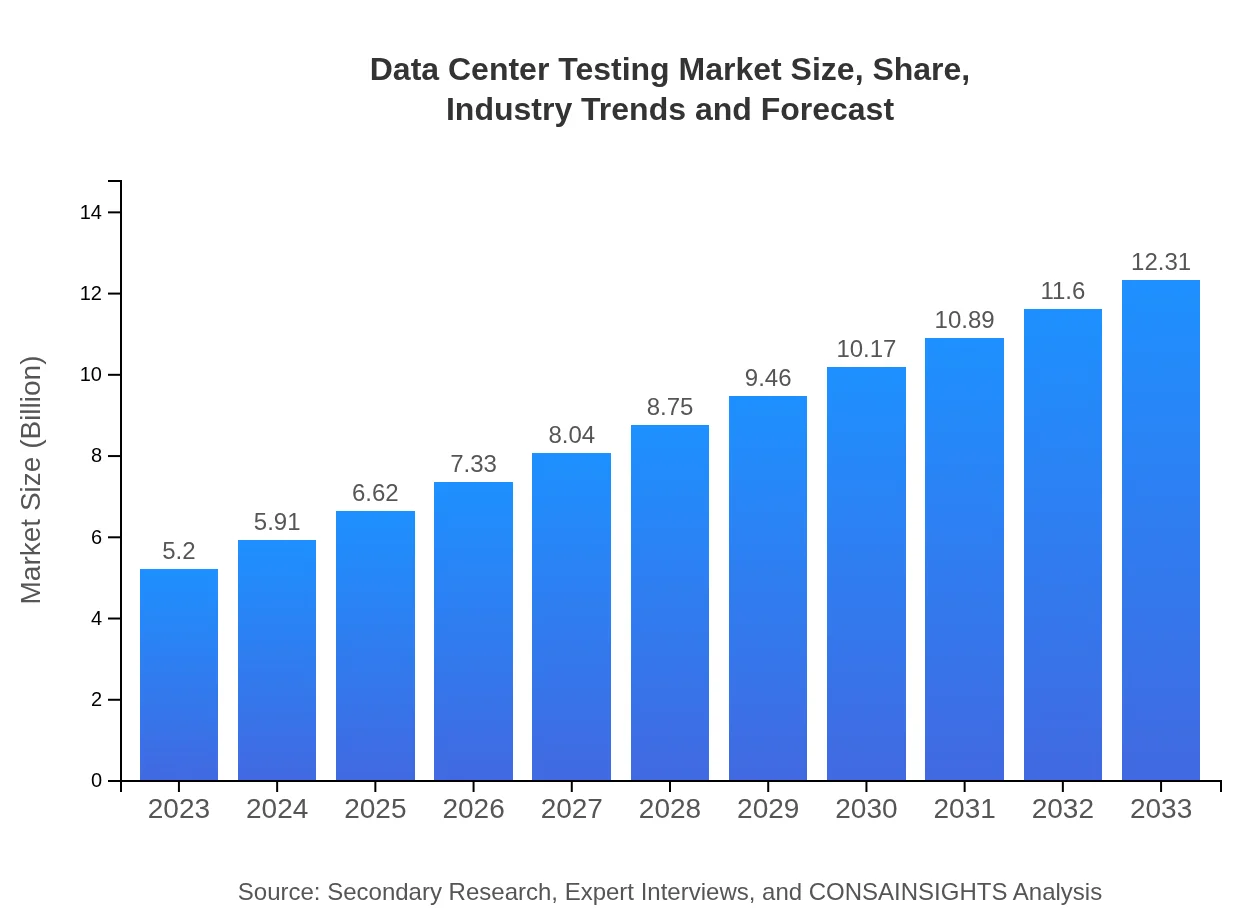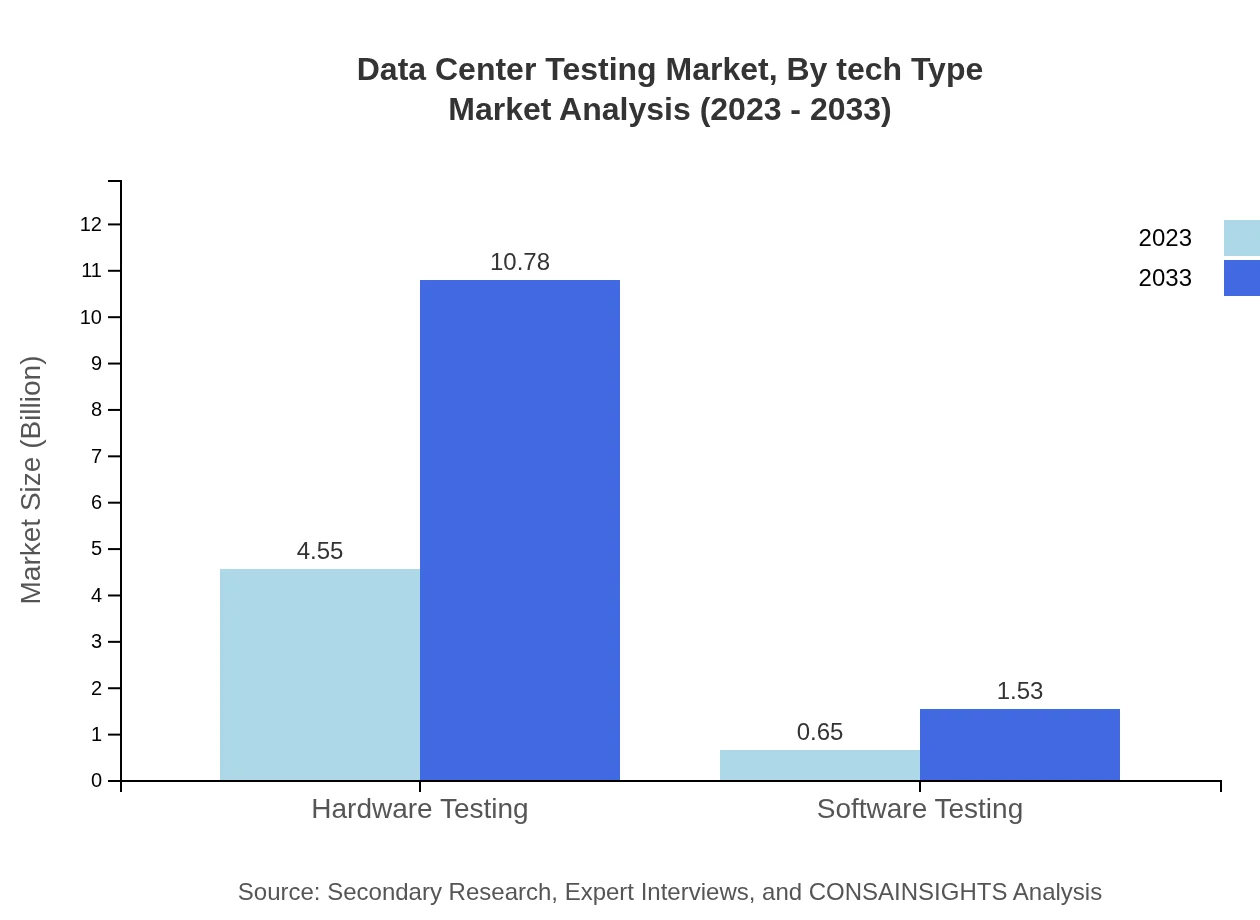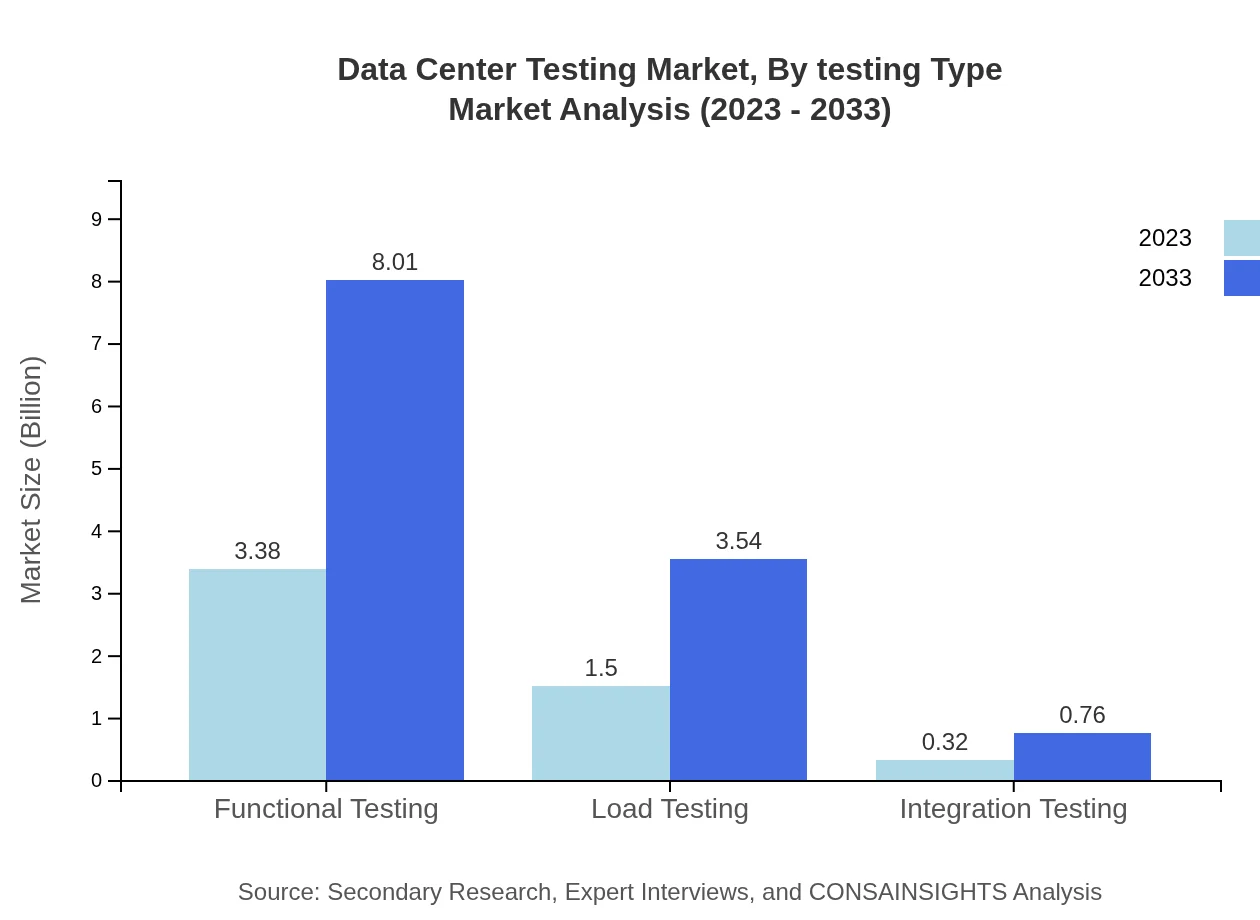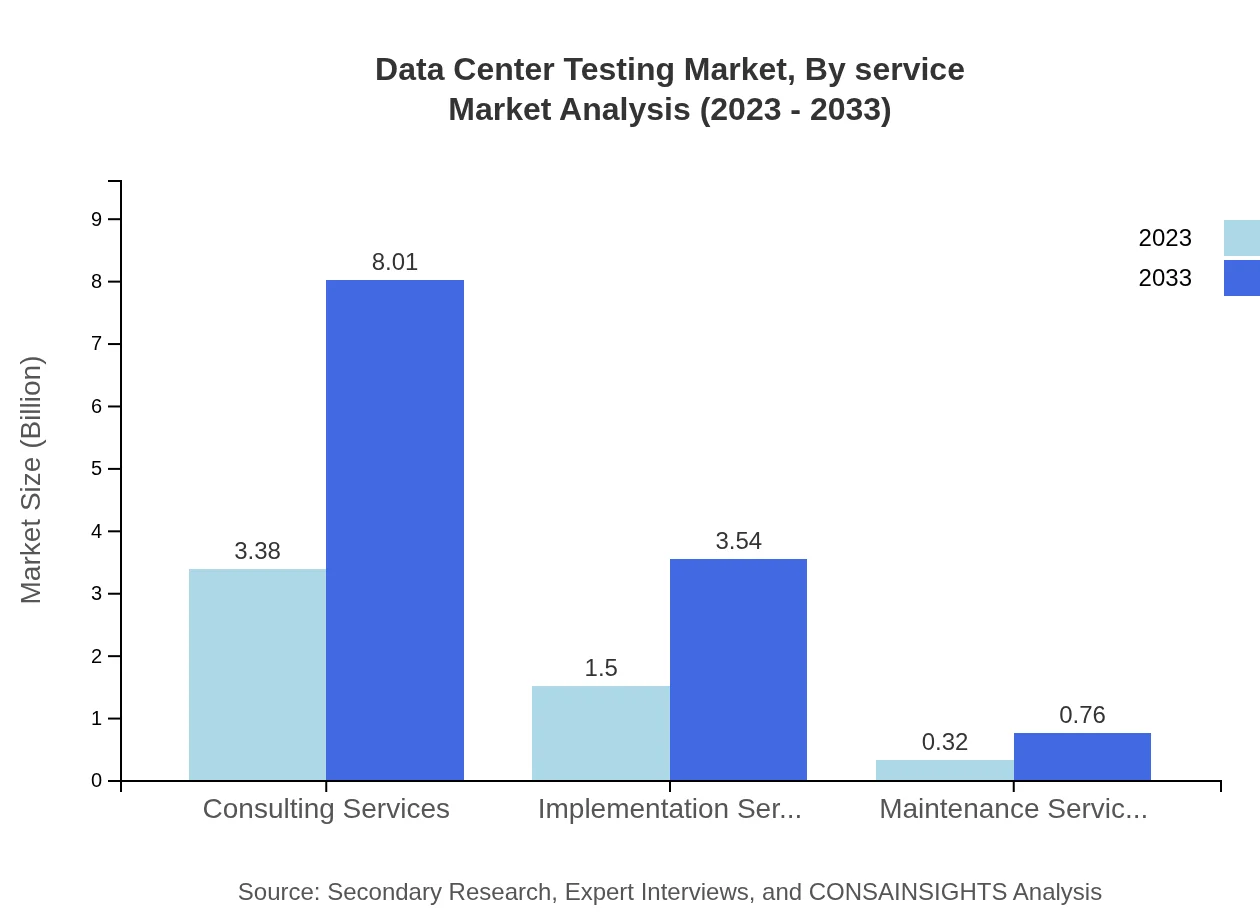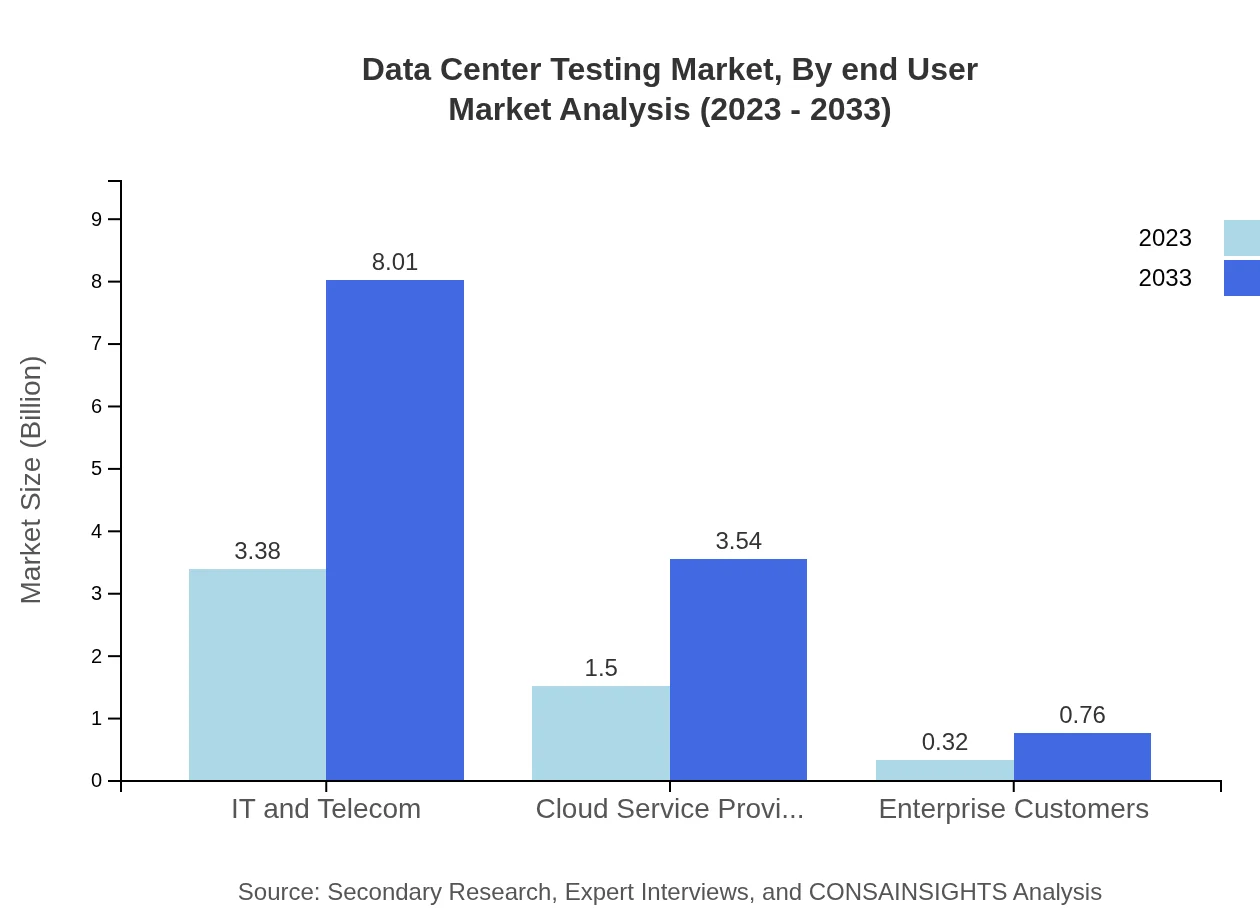Data Center Testing Market Report
Published Date: 31 January 2026 | Report Code: data-center-testing
Data Center Testing Market Size, Share, Industry Trends and Forecast to 2033
This report delves into the Data Center Testing market, offering insights into its growth projections from 2023 to 2033. The analysis encompasses market size, segmentation, regional trends, technology advancements, and key industry players.
| Metric | Value |
|---|---|
| Study Period | 2023 - 2033 |
| 2023 Market Size | $5.20 Billion |
| CAGR (2023-2033) | 8.7% |
| 2033 Market Size | $12.31 Billion |
| Top Companies | IBM, Cisco Systems, Inc., Microsoft Corporation, Hewlett Packard Enterprise |
| Last Modified Date | 31 January 2026 |
Data Center Testing Market Overview
Customize Data Center Testing Market Report market research report
- ✔ Get in-depth analysis of Data Center Testing market size, growth, and forecasts.
- ✔ Understand Data Center Testing's regional dynamics and industry-specific trends.
- ✔ Identify potential applications, end-user demand, and growth segments in Data Center Testing
What is the Market Size & CAGR of Data Center Testing market in 2023?
Data Center Testing Industry Analysis
Data Center Testing Market Segmentation and Scope
Tell us your focus area and get a customized research report.
Data Center Testing Market Analysis Report by Region
Europe Data Center Testing Market Report:
The European Data Center Testing market is projected to grow from $1.64 billion in 2023 to $3.87 billion by 2033. The region is known for its robust regulatory framework regarding data protection and cybersecurity, propelling investments in reliable testing services. The growing trend of data localization is also shaping the market landscape.Asia Pacific Data Center Testing Market Report:
In 2023, the Asia Pacific Data Center Testing market is valued at $0.88 billion and is projected to reach $2.09 billion by 2033. The region's growth is fueled by the rapid expansion of data centers to support digital economies, particularly in countries like China, India, and Japan. Increasing investments in IT infrastructure and a significant rise in mobile device usage are further accelerating the market.North America Data Center Testing Market Report:
North America leads the Data Center Testing market with a valuation of $1.97 billion in 2023, forecasted to grow to $4.66 billion by 2033. The presence of major technology firms and ongoing digitization initiatives across various sectors bolster market demand. Additionally, stringent data regulations further emphasize the need for comprehensive testing solutions.South America Data Center Testing Market Report:
The South American market for Data Center Testing is expected to grow from $0.32 billion in 2023 to $0.76 billion by 2033. The growing adoption of cloud services and burgeoning internet penetration in the region are driving factors. As businesses seek to enhance their data capabilities, the demand for effective testing solutions is likely to rise.Middle East & Africa Data Center Testing Market Report:
In the Middle East and Africa, the Data Center Testing market is anticipated to grow from $0.39 billion in 2023 to $0.93 billion by 2033. The region's digital transformation initiatives and rising demand for data management solutions are key factors contributing to market expansion.Tell us your focus area and get a customized research report.
Data Center Testing Market Analysis By Tech Type
The Data Center Testing market can be divided into various technology types such as hardware testing and software testing, which play crucial roles in maintaining data center reliability. In 2023, the hardware testing segment represents a significant share of the market, accounting for 87.58%. This segment includes testing solutions that ensure hardware components function reliably under different load conditions. Similarly, the software testing sector, while smaller at 12.42%, is imperative as data centers increasingly rely on software solutions for core operations.
Data Center Testing Market Analysis By Testing Type
The market is influenced by various testing types, including functional testing, load testing, integration testing, and more. Functional testing remains dominant with a market size of $3.38 billion in 2023, capturing 65.05% of the total share. Load testing is also significant, projected to reach $3.54 billion by 2033, while integration testing holds a smaller yet crucial segment.
Data Center Testing Market Analysis By Service
Regarding services provided, the consulting services segment emerges as the leader, set to increase from $3.38 billion in 2023 to $8.01 billion by 2033. Implementation services follow, with expected growth from $1.50 billion to $3.54 billion over the same period. The maintenance services segment, though relatively smaller, is projected to double its market size, growing from $0.32 billion to $0.76 billion.
Data Center Testing Market Analysis By End User
End-users in the Data Center Testing market include IT and telecommunications firms, cloud service providers, and enterprise customers. The IT and telecom segment claims the largest share, reflecting the sector's critical reliance on data integrity. Cloud service providers are also expanding their testing capabilities as they scale their offerings, while enterprise customers increasingly recognize the value of robust testing.
Data Center Testing Market Trends and Future Forecast
Tell us your focus area and get a customized research report.
Global Market Leaders and Top Companies in Data Center Testing Industry
IBM:
IBM leads the Data Center Testing market with innovative solutions that focus on both hardware and software performance optimization, ensuring maximum uptime and reliability of data centers.Cisco Systems, Inc.:
Cisco provides comprehensive testing tools aimed at assessing network performance and security in data centers, facilitating seamless operations for enterprises.Microsoft Corporation:
Microsoft is a key player in the market, focusing on cloud-based testing solutions that enhance data center virtualization and management.Hewlett Packard Enterprise:
Hewlett Packard Enterprise specializes in advanced hardware testing solutions, ensuring that data center components meet stringent performance criteria.We're grateful to work with incredible clients.









FAQs
What is the market size of data Center Testing?
The data center testing market is projected to reach $5.2 billion by 2033, growing at a CAGR of 8.7%. This significant size indicates robust demand for testing services, driven by increasing data center deployments and technological advancements.
What are the key market players or companies in this data Center Testing industry?
Key players in the data center testing industry include major technology firms specializing in IT infrastructure, hardware testing solutions, and consulting services. These firms are pivotal in driving innovation and meeting the rising demand for compliant and efficient testing solutions.
What are the primary factors driving the growth in the data Center Testing industry?
Growth drivers for the data center testing industry include the exponential rise in data usage, the increasing complexity of data centers, and stringent compliance requirements. Additionally, the need for enhanced security and operational efficiency fuels demand for testing services.
Which region is the fastest Growing in the data Center Testing?
The fastest-growing region in the data center testing market is North America, projected to expand from $1.97 billion in 2023 to $4.66 billion by 2033. Europe follows closely, with significant growth due to technological advancements and increased data center activity.
Does ConsaInsights provide customized market report data for the data Center Testing industry?
Yes, ConsaInsights offers customized market report data tailored to the specific needs of clients in the data center testing industry. This customized approach enables businesses to gain valuable insights that align with their strategic objectives.
What deliverables can I expect from this data Center Testing market research project?
Deliverables for the data center testing market research project typically include comprehensive reports, market analysis, trend forecasts, and segment-specific insights. Clients can expect actionable recommendations to optimize their strategies within the testing landscape.
What are the market trends of data Center Testing?
Market trends in data center testing include increased adoption of automated testing solutions, growing demand for hybrid testing environments, and an emphasis on sustainable practices. Additionally, cloud integration and AI-driven testing methodologies are on the rise.

